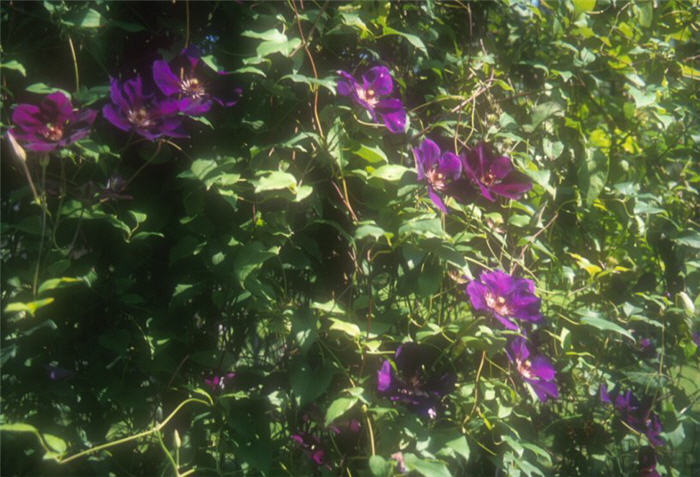| Botanical Name: Clematis x jackmanii | |
| Common Name: Jackman Clematis |

-
Anatomy
-
Culture
-
Design
Plant Type
Vine
Height Range
12-25'
Flower Color
Purple
Flower Season
Summer
Leaf Color
Dark Green
Bark Color
n/a
Fruit Color
n/a
Fruit Season
n/a
Sun
Full, Half
Water
Medium, Extra in Summer
Growth Rate
Fast, Moderate
Soil Type
Loam
Soil Condition
Average, Rich, Well-drained
Soil pH
Acid, Neutral, Basic
Adverse Factors
n/a
Design Styles
English Cottage, Mediterranean, Ranch, Spanish
Accenting Features
Showy Flowers
Seasonal Interest
Summer
Location Uses
Background, Entry, Perennial Border, Shrub Border, Foundation, Walls / Fences
Special Uses
Cut Flowers, Screen, Small Spaces
Attracts Wildlife
Butterflies
Information by: Stephanie Duer
Photographer: Steve Mullany
Photographer: Steve Mullany
-
Description
-
Notes
Jackman Clematis is a lovely, old-fashioned vine that is well suited to our urban landscapes. Showy deep purple-violet flowers cover the vine most of the summer. Once established, it is a fast grower to about 18 feet. Prune in the spring.
Plant in light, loamy, well-drained soil. There is an adage regarding clematis: "heads in the sun; feet in the shade," follow this! But there is a caution: don't place it where it will bake, for in our hot, dry summers, it is possible to get too much of a good thing. Timing of pruning depends on when the clematis blooms: as a general rule, spring and early summer blooming clematis ought to be pruned immediately after flowering; mid-summer and fall bloomers can be pruned in the spring. Clematis are twining and need support.